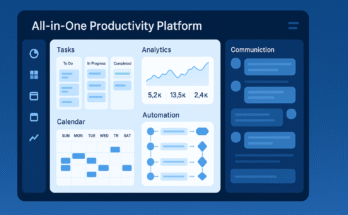The cloud is utilised by many modern businesses to allow for a more reliable and flexible way of storing programmes, software, and data. Migrating to the cloud can open doors for companies that rely on various applications to operate – it can provide the most up-to-date storage solutions, flexibility and security tailored to your business’s needs. Cloud migration can lead to the transformation of the way a business works, especially if it is mostly software-based. Read on to find out more about cloud migration and why it is essential for an IT business.
What is cloud migration?
Cloud migration is the process of transferring data or software onto the cloud. Cloud providers can help their clients move their applications, data, and software from on-premises technology to storage within the cloud. The process can differ from business to business, depending on if there is legacy infrastructure in place, or if a business is moving from one cloud to another.
The cloud is a modern way of handling operations throughout your business, and more companies are choosing to migrate so they can reap the benefits that this storage solution has to offer. The process itself can seem daunting but you shouldn’t let this put you off – with the help of your provider, you can allow your company to grow and progress.
What is the process?
From the outside looking in, the process of migrating to the cloud seems like a long, and sometimes complicated one, but it doesn’t have to be that way. Choosing a cloud provider that is perfect for your business means they can help you every step of the way, making the transition a smooth experience. Most cloud migration strategies will follow these simple steps:
- Goals: Establish what you would like to gain from making the switch to cloud storage, this helps you to determine if the migration has been successful.
- Security: This is something you should establish early on to deter hackers or any data from falling into the wrong hands.
- Copy data: Once you’ve chosen a provider, you must duplicate files, data, and documents to move to the cloud, so that it is kept up to date.
- Move business intelligence: This could mean rewriting code in line with your new storage system.
- Make the switch: Migration has reached its final step, and your data is ready to go live on the cloud and you can begin to reap the benefits.
The benefits for an IT business
Choosing to migrate to the cloud gives you access to the advantages that come along with it. As an IT business, your data must be protected, as well as easily accessible whenever you need it. Below, we’ll look at why cloud migration is key for IT companies and ways that you could benefit.
Scalability
The cloud allows you to scale your storage up and down whenever you see necessary. You can scale up with the click of a mouse to accommodate for more documents and data, or scale back down in quiet periods so you’re not paying for storage you’re not using. In contrast, if businesses were still using on-premises or legacy infrastructure, scaling up would cost money, and take time as well as additional resources. Cloud migration can also save time – one of the main aims of the cloud is to deploy apps and software faster than ever before, so there’s no more waiting for downloads or updates.
Security and Recovery
When implementing cloud migration, you must make sure that the platform you are using has a solution that protects your data safe from unwanted traffic. When migrating to the cloud, you must take on some of the responsibility when it comes to security, in conjunction with the solutions your provider will put in place for you. When choosing a provider, you should make sure that they adapt your security package to your business. IT businesses particularly need to prioritise security, as most operations will take place online and in the cloud.
Recovery is also critical for an IT business. As previously mentioned, much of your work will be dealt with online and within the cloud, so you must trust that if your cloud fails, or something goes wrong externally, you can recover what has been lost with ease. Backups can be taken quickly and effectively using cloud platforms, which means you can keep your data, software, and documents safe. Keeping up to date with backups gives you additional peace of mind.
Reliability
The cloud is one of the most advanced and modern ways to store your business’s data and is created specifically with your business in mind. One of the many reasons that companies are beginning to migrate is because of the reliability the cloud has to offer. It is constantly updating, which means you’re going to get the best service available, at all times. It also allows for you, or any of your employees to access their work wherever they are, reliably and easily – so you can implement flexible or hybrid working.
In general, cloud migration allows you to modernise your business for the better and gives you access to benefits that allow your business to run smoothly, and efficiently. Taking the time to implement security means you can protect your data, and choosing the right platform means you can reap the benefits of the cloud, in a way that is unique to your business.




